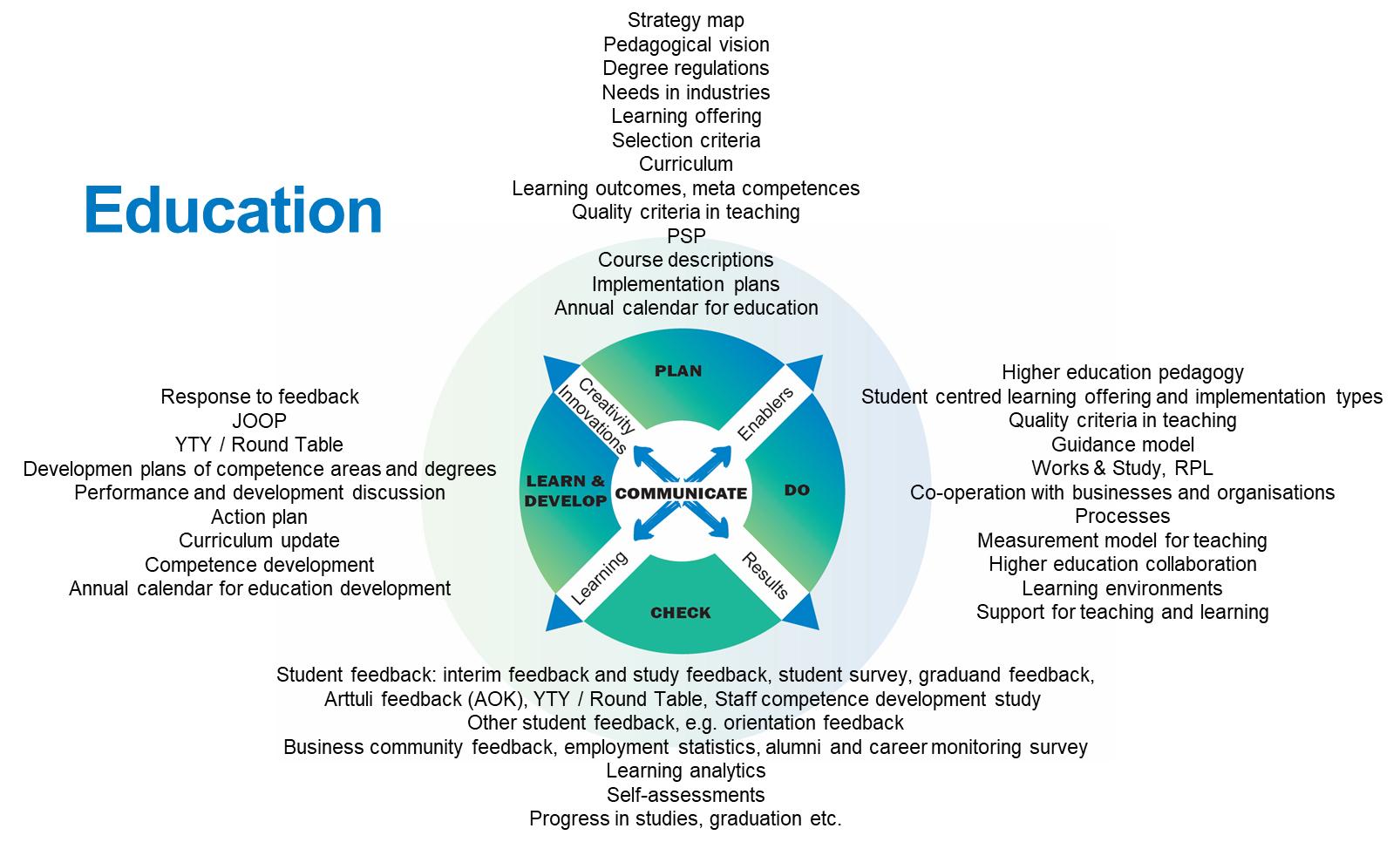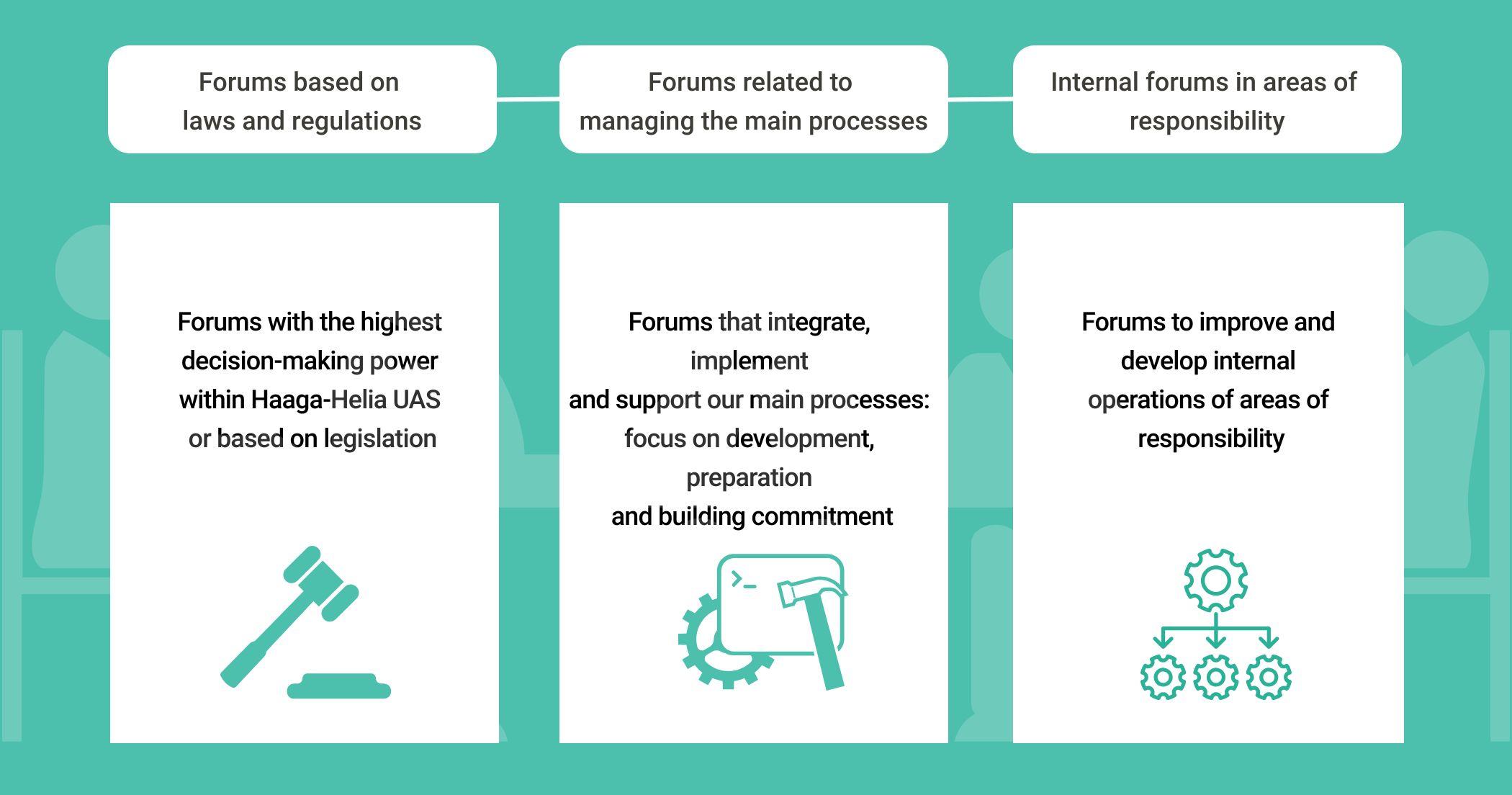The quality system produces extensive information about Haaga-Helia’s core duties
Haaga-Helia has built functioning procedures for reviewing the achievement of the strategy and of annual plans. Haaga-Helia uses the quality system to be able to identify its development needs and enhance its operations in line with the strategy. The audit team sees that Haaga-Helia has succeeded in creating an open and participatory quality culture for both staff and students. It has installed functioning procedures to evaluate all stages of the student’s studying cycle; from the orientation days to graduation and from health and sport services to the Work&Study model and related counselling guidance services. Haaga-Helia’s mission is to open doors to future careers. There is a strong connection with working life, which results for example from the flexibility of studies which makes it possible to study even with a full-time job. The teaching staff also emphasized the good collaboration with working life networks in the interviews. Haaga-Helia’s Work&Study programme is a great way to combine studies with working, but further improvement of the model is still needed as described in chapter 4.
There is room for improvement in the feedback system
Feedback plays a key role in the development and functionality of Haaga-Helia’s quality system. For example, feedback is part of the process ensuring that courses meet their requirements and ensuring that Haaga-Helia’s studies match the requirements of working life. Another example that came out in the interviews was that “we need better data quality in reporting systems, for example: course feedback reports do not separate students who completed the course or dropped out—therefore we also don’t know why they dropped out.” The interviewed teachers described the feedback from students as a valuable instrument for competence development. The audit group agrees with the view that feedback is actively utilized in operational development. As a consequence, its continuous improvement of feedback systems is very important.
The audit team encourages Haaga-Helia to enhance its feedback procedures especially concerning teaching and finding new ways to get students to give feedback more actively. Some of the interviewed students reported that sometimes their feedback concerning courses changed things and somethings they did not know what happened to their feedback. One way to motivate students to give more feedback on teaching could be to improve the feedback-on-feedback procedure so that students would feel the impact of the feedback given to teachers. In addition, an allocated time to fill in the feedback forms at the end of the course could increase participation in the feedback process.
Haaga-Helia’s operating culture supports the development of operations after major changes
Haaga-Helia’s participatory culture became obvious in the interviews. The audit team got an impression that both the staff and students feel that their opinions are heard and taken into account, and that their opinions and wishes had an impact. For example, the student organization members told the audit team that they had proposed ways to improve the possibilities for international students to find jobs in Finland and proposed more excursions in English. The student representatives told the audit team that both issues are currently being considered because of their initiative. The staff also gave Haaga-Helia mainly positive feedback in the interviews and workshops. The teachers described the situation in the following way: wishes are listened to and taken into consideration, opinions are heard and there is a high level of trust.
The personnel survey from 2021 indicates that the whole staff is committed to high quality development of their expertise and continuous improvement. The audit team had the clear impression that autonomy of work, open culture and team teaching is appreciated by the staff.
Teachers seem to be quite independent when deciding what and how they teach. Nevertheless, the audit team recommends Haaga-Helia to make sure that this independence does not decrease the quality of teaching. There were signals on this also in the interviews, described as follows: “as the teachers can teach what they want, the quality of teaching is not necessarily equal.” The audit team received wishes concerning more contacts between colleagues and getting to know new and competent colleagues. Possibilities to meet with colleagues from other substance areas was mentioned in the interviews several times as well as sharing of good practices within and between campuses and teams. The interviewees also hoped for more time to settle into the new organization, for bringing the change procedure to a successful end and to improve change management. In this regard, Haaga-Helia still has work to be done.
The new organization was established partly to increase openness and to prevent silos. The audit team considers that reaching these aims is still in progress and Haaga-Helia should put more effort especially in improving communication and cooperation between competence areas, responsibility areas, and campuses. However, a participatory operating culture creates good conditions for achieving these goals.

